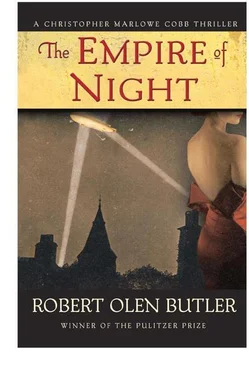He put the bottle down between us.
A Pennsylvania whiskey. Sam Thompson Old Monongahela Pure Rye , with an etching of Sam’s riverside distillery in Pittsburgh.
Stockman and I touched glasses.
“To the hardworking Isabel Cobb,” I said.
“To Isabel,” he said, putting as much into her name as my mother had put into her eyes about him . He was in love.
At that, I took the bolt of rye gladly, took it in full, relishing the burn down the throat, like a Pennsylvania summer noonday sun. And it bit with the spiciness of a pure rye, this particular one mixing cloves and pumpkin and cracked pepper.
When I lowered my glass and my face, I found Stockman looking at me. He’d sipped his. He was smiling a little half smile at me. “Were you ever a soldier, Mr. Hunter?”
“Can you call me Josef?” I said.
He cocked his head.
I said, “When I was brought as a child to America my name was Josef Wilhelm Jäger.”
He smiled. “Of course,” he said. “Josef.”
“Never a soldier,” I said.
“And if you’d stayed?” he asked.
“In Germany?”
“Yes.”
“Perhaps not for the sake of the colonies. But for this war, I would have been in a trench in France by now. There is no doubt.”
He nodded.
“With joy,” I said, picking up on his observation from last night.
He lifted his glass to me and shot the rest of his rye.
He put three fingers in each of our two glasses.
I’d take this one slow.
We both lifted our glasses.
No toast this time. We were just two guys doing some serious drinking together. I liked that.
I sipped.
Off to my left, there was movement. I let the rye slide down my throat and I casually looked.
A German officer and a woman were arranging themselves at a table. His field gray tunic had a high turnover collar, and his shoulder boards were cornflower blue with two pips. A cavalry captain. I saw him in left profile. His cheek was imprinted with the crescent scar of his university fencing days. A Schmiss .
The scar caught my eye and held my gaze for longer than I’d intended. I could see, in my periphery, Stockman turning to look as well.
The woman was a peach, wearing a green silk and organdy evening gown with a high waist that lifted up and presented her ample bosom as if on an invisible platter. She was in the process of stripping off long, white kid gloves.
I looked at Stockman and he was still watching the couple. Then he turned back to me. He leaned across the table and flipped his chin to have me bend near.
“ Nicht Gesellschaftsfähig ,” he said. He caught himself. For this observation, he hadn’t meant to speak German. He shot the couple a quick glance. They only had eyes and ears for each other. He returned to me and said it again in English, speaking even more softly, translating the euphemism literally. “Not fit for society.”
I looked at her.
Perhaps.
As I watched her — they too bent near each other — Stockman said, “Not that I criticize him. He has earned this privilege.”
The captain said something and the woman smiled softly. She lifted her right hand and brought it to his cheek and gently began to trace his Schmiss with the tip of her forefinger.
“She is his fiancée,” I said. I looked back to Albert. His face was blank. He wasn’t used to being contradicted; I feared I was overplaying our growing rapport. I angled my head for him to look. “The gesture.”
He looked.
She was still moving her fingertip over her captain’s scar.
Stockman chuckled softly, and he and I turned to each other, still leaning near. “You’re right,” he said. “But he will never have a moment of peace when he is apart from her. For fear her tenderness may stray.”
I thought: Like you with my mother.
I nodded in agreement.
And then he surprised me. He lowered his voice still more. “Nor will she,” he said.
Briefly I thought he was still talking about sex. But he said, “So many good men will die.”
We took up our drinks. We sat back. This time I was the sipper and he immediately took the shot.
I knew if I was to justify those two boxes remaining in Reinauer’s office, I’d have to get closer still to Albert. I’d never do that if I started thinking out each move. As he lowered his whiskey glass after his emotional bolt, I understood all this. And so I stopped thinking. Which allowed me to say, “Can I tell you a secret?”
Stockman leaned forward again. Rather abruptly. “Of course,” he said.
I leaned in slowly.
I said, “I too have a Schmiss. ”
His eyes moved slowly, deliberately, to my bearded left cheek and then returned to mine.
“I think I told you I grew up in America,” I said, leading us back to German. “My father made sure that I spoke the mother tongue. I was not allowed to say even a single English word in our house. And he wanted me to have an education. I also wanted that, but I dreamed of the University of Michigan. My father had other plans. He insisted I go home to university.”
I paused very briefly, to let the home sink in. Stockman said, “He is a good man, your father.”
“So I came to realize,” I said. “In 1902, when I was eighteen, I packed a bag and I came to Heidelberg and they welcomed me and they disciplined me and they allowed me into their inner circle and I took up a saber and I earned my badge of honor.”
He glanced at the place of my presently invisible scar.
I’d said my piece.
He looked at me closely for a long moment, reassessing me one more time. Then he said, “I must ask you why is this a secret. Why do you cover up this mark?”
I said, “For the same reason it is necessary to write newspaper stories for the people of America to explain the real Germany. This is something not in their blood.”
“I understand,” Stockman said.
He leaned back. He palmed the ends of the chair arms. “But you are in Germany now,” he said.
“I am.”
“Josef,” he said. “Would you do a favor for me?”
“Yes.”
“Would you go upstairs to your room, right now, and shave off your beard?”
This took me by surprise. But the reflex feeling I would have had even a few minutes ago did not occur. I did not for a moment hear this as the calling of a suspected bluff. He was mellow, avuncular even, in his manner and tone. He was encouraging me to come even closer to him.
“I will,” I said.
“Good,” he said. “You must wear this scar with pride. It is a rare thing. It is a precious thing.”
“I shed my German blood for it,” I said.
He smiled.
I stood before my mirror. The last thing he said as I’d risen to go was that he would wait, that he was looking forward to speaking this evening with Josef Wilhelm Jäger.
I found my hand severely steady as I worked the lather into my beard, as if I were about to pull a trigger. This was a badger-hair shaving brush, not a.32 caliber Mauser, but my body had invoked my conditioned response to a spy’s stage nerves. It had been bad enough this past spring, confronting the scar for the first time since the wound had healed and I’d let my beard cover it up. Now this second revelation was odd indeed: I was fully asserting my cover identity to a German spy by showing him my actual face, which was, however, forever altered by the first German spy I’d ever confronted. And rubbing the cream into my cheeks summoned up my mother from this morning, her hands rubbing color into this beard, turning me into my battered doppelgänger to disguise me from the very man who was now waiting downstairs to see my naked face. Which would convince him utterly that I was someone I was not.
Читать дальше












